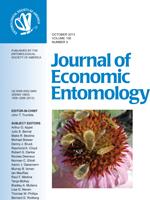Cold storage is used to preserve fruit quality after harvest during transportation in marketing channels. Low temperature can be a stressor for insects that reduces survivorship, and cold storage may contribute to the efficacy of postharvest quarantine treatments such as irradiation against quarantine insect pests. The combined effect of irradiation and cold storage was examined in a radiation-tolerant fruit fly, Bactrocera cucurbitae Coquillet (melon fly), and a radiation-intolerant fruit fly, Ceratitiscapitata (Wiedemann) (Mediterranean fruit fly) (Diptera: Tephritidae). Third instars on diet or in papaya were treated with a sublethal radiation dose of 30 Gy and stored at 4 or 11°C for 3–13 d and held for adult emergence. For both fruit fly species, survival of third instars to the adult stage generally decreased with increasing cold storage duration at 4 or 11°C in diet or papaya. Survivorship differences were highly significant for the effects of substrate (diet > papaya), temperature (11 > 4°C), and irradiation (0 > 30 Gy). Few Mediterranean fruitflies survived in any cold storage treatment after receiving a radiation dose of 30 Gy. No melon fly larvae survived to the adult stage after irradiation and 11d cold storage at 4 or 11°C in papayas. Cold storage enhances the efficacy and widens the margin of security in postharvest irradiation treatments. Potentially irradiation and cold storage can be used in combination to reduce the irradiation exposure requirements of quarantine treatments.
How to translate text using browser tools
1 October 2013
Cold Storage Enhances the Efficacy and Margin of Security inPostharvest Irradiation Treatments Against Fruit Flies (Diptera: Tephritidae)
Peter A. Follett,
Kirsten Snook
ACCESS THE FULL ARTICLE
It is not available for individual sale.
This article is only available to subscribers.
It is not available for individual sale.
It is not available for individual sale.

Journal of Economic Entomology
Vol. 106 • No. 5
October 2013
Vol. 106 • No. 5
October 2013
irradiation
phytosanitary treatment
postharvest
quarantine
systems approach




